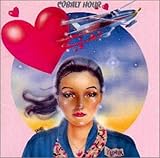曲の紹介(やさしさに包まれたなら)
【曲 名】やさしさに包まれたなら
【アーティスト】荒井由美(現:松任谷由美)
【作詞・作曲】荒井由実(現:松任谷由美)
【レーベル】EMIミュージック・ジャパン
【概 要】
1974年4月に3枚目のシングルとしてリリースされ、同年10月にリリースされた2枚目のアルバム「MISSLIM(ミスリム)」にアルバム・バージョンが収録された。
1976年6月20日にリリースされた初のベストアルバム「YUMING BRAND(ユーミン・ブランド)」にシングル・バージョンが収録された。
1989年公開の宮崎駿監督の映画「魔女の宅急便」の主題歌に使用され、再度脚光を浴びた。
【記事引用元】やさしさに包まれたなら (荒井由実の曲)- Wikipedia
【記事引用元】松任谷由実 – Wikipedia
曲について
この曲は、軽快なシンプルな曲調ですが、歌詞はとても深いメッセージを持っています。
主人公は子供の頃の思い出を振り返り、優しさに包まれていた瞬間を懐かしく思い出し、母親や家族、そして他の人からの優しさに対する感謝の気持ちを表現していて、そのメッセージは多くの人の心に響きます。
そしてサウンドは、心地よいメロディラインと、彼女の優しい歌声が絶妙にマッチしていて、リスナーにタイトルが表すような「やさしさ」を感じさせてくれます。
- 2015年11月25日アルバム「松任谷由実 40周年記念ベストアルバム 日本の恋と、ユーミンと。」バージョン
- 1996年8月13/14/15日中野サンプラザライブ・アルバム「Yumi Arai The Concert with old Friends」バージョン
アーティストの紹介(松任谷由美)
【アーティスト】松任谷由美(旧:荒井由実)
【誕生日】1954年1月19日
【出身地】東京都八王子市
【公式サイト】松任谷由実オフィシャルサイト
アーティストの軌跡
松任谷由実(まつとうや ゆみ)本名:荒井由実(あらい ゆみ)は、1970年代から日本の音楽シーンで活躍し続けている女性シンガーソングライターで、彼女の音楽は、青春の喜びや切なさ、恋愛の喜びや苦悩を描き、リスナーに深い共感を与えている。
彼女は、6歳でピアノを始め幼少期から音楽と親しむ環境に育った。
この音楽経験が、彼女の後のキャリアに大きな影響を与えた。
高校時代はパイプオルガンやプロコル・ハルムといった音楽に強い影響を受け、また、アルチュール・ランボーやジャック・プレヴェールといった詩人たちの作品に深い感銘を受けて、芸術的な感性が磨かれていった。
1971年、高校3年生の時に作ったデモテープが音楽業界で注目を浴び、17歳で作曲家としてのキャリアをスタートさせた。
その後、1972年にシングル「返事はいらない」で荒井由実としてデビューしたが、初期の作品はあまり注目されなかった。
1973年に発売されたファーストアルバム「ひこうき雲」が徐々に評価され、彼女の名前が知られるようになった。
アルバム表題曲の「ひこうき雲」と、翌年シングルリリースされた「やさしさに包まれたなら」はヒットし、彼女の代表曲となった。
彼女の楽曲は独自の世界観を持ち、当時のフォークやロックとは一線を画していた。
1975年フォークグループ「バンバン」に提供した「いちご白書をもう一度」が大ヒットし、続いて自身のシングル「あの日にかえりたい」もオリコンチャート1位を獲得した。
これにより、荒井由実は一躍時代を代表するシンガーソングライターとしての地位を確立した。
1976年松任谷正隆と結婚し、アーティスト名も松任谷由実へと改名し、音楽活動を続けた。
改名後は一時的な低迷期を迎えたが、1981年にリリースしたシングル「守ってあげたい」が再び大ヒットし、第二次ブームが到来した。
その後、アルバムは連続してオリコン1位を獲得するなど、彼女の人気は再び急上昇した。
1988年にリリースされたアルバム「Delight Slight Light KISS」は158万枚を売り上げ、彼女初の年間アルバムランキング1位を獲得した。
その後の「LOVE WARS」(1989年)や「天国のドア」(1990年)も連続して年間1位を獲得し、彼女の音楽はバブル時代といわれる日本を代表するものとなった。
この時期には「恋人がサンタクロース」「真珠のピアス」「時をかける少女」などのヒット曲が生まれ、またリゾート地でのコンサートという新しいスタイルも確立した。
彼女のコンサートは常に革新的で、象や噴水、巨大な竜などを登場させる大規模な演出が話題となった。
1990年代に入っても、彼女の音楽は人気を保ち続けた。
1993年には「真夏の夜の夢」が自身初のミリオンセラーとなり、
1994年には「Hello, my friend」「春よ、来い」が続けてミリオンセラーを記録した。
1998年にリリースされたベストアルバム『Neue Musik』は380万枚を売り上げ、彼女のキャリア最大のヒット作となった。
1999年にはロシアのサーカスチームとコラボレートしたコンサート『シャングリラ』を開催し、この壮大なプロジェクトは2007年まで続いた。
2000年代においても、彼女は日本の音楽シーンにおいて数々の革命をもたらし、多くの人々に影響を与え続けており、彼女の音楽は時代を超え、多くのリスナーに愛されている。
アルバムの紹介
1973年 ひこうき雲
1974年 MISSLIM(ミスリム)
1975年 COBALT HOUR
1976年 14番目の月
2024年 ユーミン万歳! ~松任谷由実50周年記念ベストアルバム~




